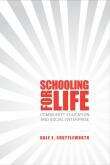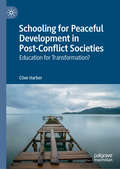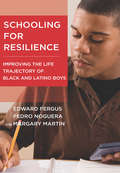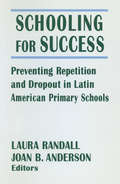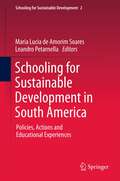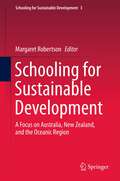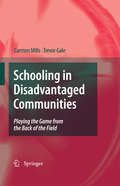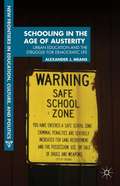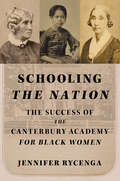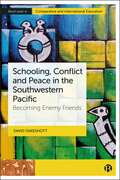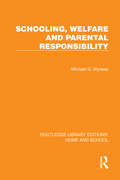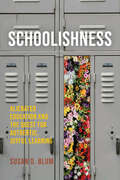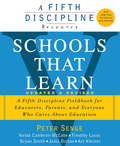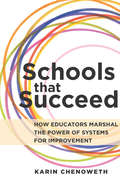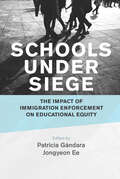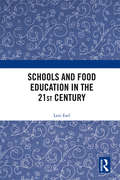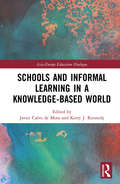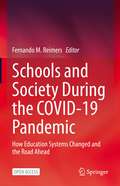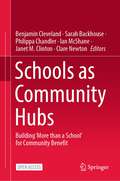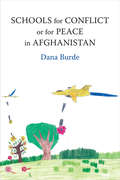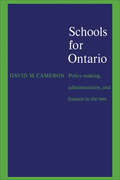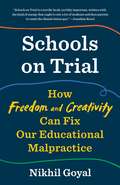- Table View
- List View
Schooling for Life
by Dale ShuttleworthDuring the first decade of the twenty-first century, schools and communities find themselves struggling with concerns of youth violence, child poverty, and race relations in an economy mired in recession. In Schooling for Life, esteemed community educator Dale E. Shuttleworth brings his rich experiences as a teacher, principal, school superintendant, policy writer, community development worker, social entrepreneur, and university course director to a discussion of public education and its role in the communities that it serves.In an historic overview of how and why public schooling has changed since 1965, Schooling for Life traces a series of demonstration projects which have influenced policy development and innovative practice in such fields as inner city education, multi-cultural and race relations, adult education, economic development, and skill training. This timely work represents a blueprint for community education and development as society faces the challenges of social, economic, and political renewal.
Schooling for Peaceful Development in Post-Conflict Societies: Education for Transformation?
by Clive HarberThis book explores how, and if, formal education affects peacebuilding in post-conflict societies. As schooling is often negatively implicated in violent conflict, the author highlights the widely expressed need to ‘build back better’ and ‘transform’ schooling by changing both its structures and processes, and its curriculum. Drawing upon research from a wide range of post-conflict developing societies including Cambodia, Colombia and Kenya, the author examines whether there is any empirical support for the idea that schooling can be transformed so it can contribute to more peaceful and democratic societies. In doing so, the author reveals how the ‘myth’ of building back better is perpetuated by academics and international organisations, and explains why formal education in post-conflict developing societies is so impervious to radical change. This important volume will appeal to students and scholars of education in post-conflict societies.
Schooling for Resilience: Improving the Life Trajectory of Black and Latino Boys (Youth Development and Education Series)
by Pedro Noguera Edward Fergus Margary MartinAs a group, Black and Latino boys face persistent and devastating disparities in achievement when compared to their White counterparts: they are more likely to obtain low test scores and grades, be categorized as learning disabled, be absent from honors and gifted programs, and be overrepresented among students who are suspended and expelled from school. They are also less likely to enroll in college and more likely to drop out. Put simply, they are among the most vulnerable populations in our schools.Schooling for Resilience investigates how seven newly formed schools, created specifically to serve boys of color, set out to address the broad array of academic and social problems faced by Black and Latino boys. Drawing on student and teacher surveys, focus groups, interviews, and classroom observations, the authors investigate how these schools were developed, what practices they employed, and how their students responded academically and socially. In particular, they focus on the theory of action that informed each school&’s approach to educating Black and Latino boys and explore how choices about school structure and culture shaped students&’ development and achievement. In doing so, the authors identify educational strategies that all schools can learn from. This thoughtful, passionately argued volume promises to influence efforts to improve the achievement and life outcomes of Black and Latino boys for years to come.
Schooling for Success: Preventing Repetition and Dropout in Latin American Primary Schools (Columbia University Seminar Ser.)
by Laura Randall Michael R AndersonThe link between economic development and education in Latin America is generally well-recognized. A literate and educated work force is the largest single factor in explaining economic growth. In this study, the editors and contributors survey the various elementary educational systems to investigate the reasons behind the failure of schools to retain students in elementary grades. A group of scholars looks at the current state of education in four countries: Mexico, Argentina, Brazil, and Chile, with a view to designing more effective programs for reducing the dropout and grade repetition rates. For each country studied, there is an overview of the school system, teacher training and attitudes, centralized and decentralized planning, curriculum development, and psychological and environmental issues that contribute to school dropout.
Schooling for Sustainable Development in South America
by Leandro Petarnella Maria Lucia de Amorim SoaresThis book supplies both empirical evidence and scholarly analysis that exemplify successful innovation in South America in the field of sustainability education. Examining the issues from a three-fold perspective, of national policy, regional planning and grassroots projects in schools and communities, the volume offers a comprehensive overview of the contemporary situation in Brazil, Chile, Bolivia, Argentina and Venezuela. It provides case studies as detailed illustrations of the recipe for success as well as to inform researchers and practitioners of the kinds of obstacles and challenges they might face in seeking to manifest sustainability. A good deal of the research and scholarly studies in the field of education for sustainability and sustainable development is underpinned by 'Western' norms and culture. This book draws on that literature, yet also teases out features in the case studies that are particular to the region. South America itself encompasses a rich variety of natural and cultural environments--within individual nations as much as continent-wide. This diversity is a recurring theme in the book. The volume's three sections provide first a general survey, enriched with material from studies conducted in a number of different polities. The second section covers developments in Brazil, South America's largest nation and one that exhibits many of the features of education for sustainability found across the continent. Part three sets out and explores future trends. As with other books in the Schooling for Sustainable Development series, this volume will add impetus to scholarly exchange as well as contributing insights on education policy and curriculum changes across South American communities that exist in an increasingly globalized world.
Schooling for Sustainable Development:
by Margaret Robertson"This book Schooling for Sustainable Development: A Focus on Australia, New Zealand and the Oceanic Region, is the product of passionate interests of teachers, scholars and researchers located in diverse parts of the Australasian region. Working with their colleagues within local contexts they have conducted research and gathered together information for practitioners and students interested in learning more about sustainable lifestyle practices. Some of the work has taken place in remote locations and some has been in within the confines of major cities. The Australasian Region brings together people and cultures that link traditional economies to global networks and lifestyles. Diverse terrain, politics and responses typify the region. Close to Asia there are lingering ties with old European ways and cultural beliefs. The major economies of Australia and New Zealand provide the lead with development practices for lesser economies such as Papua New Guinea, Fiji and the many island nations scattered throughout the South Pacific. This complexity is not easily represented. Key issues relate to land ownership, mobilities within the region and the gradual dissemination of knowledge, skills and wealth. The book will provide both reference material and interesting reading for teachers, researchers and practitioners in interested in community based perspectives on sustainability. We have learnt from each other and hope that others will benefit from our efforts."
Schooling in Disadvantaged Communities
by Carmen Mills Trevor GaleBased on a study of one secondary school located in a disadvantaged community in Australia, this book provides a different perspective on what it means to 'play the game' of schooling. Drawing on the perspectives of teachers, parents and students, this book is a window through which to explore the possibilities of schooling in disadvantaged communities. The authors contend that teachers, parents and students themselves are all involved in the game of reproducing disadvantage in schooling, but similarly, they can play a part in opening up opportunities for change to enhance learning for marginalised students. Rather than only attempting to transform students, teachers should be also be concerned to transform schooling; to provide educational opportunities that transform the life experiences of and open up opportunities for all young people, especially those disadvantaged by poverty and marginalised by difference. The book is also designed to stimulate understanding of the work of Bourdieu as well as of a Bourdieuian approach to research. Seeing transformative potential in his theoretical constructs, it airs the possibility that schools can be more than mere reproducers of society.
Schooling in the Age of Austerity: Urban Education And The Struggle For Democratic Life (New Frontiers In Education, Culture And Politics Ser.)
by Alexander J. MeansThrough a case study in a Chicago public school, Means demonstrates that, despite the fragmentation of human security in low-income and racially segregated public schools, there exist positive social relations, knowledge, and desire for change that can be built upon to promote more secure and equitable democratic futures for young people.
Schooling the Nation: The Success of the Canterbury Academy for Black Women (Women, Gender, and Sexuality in American History)
by Jennifer RycengaFounded in 1833 by white teacher Prudence Crandell, Canterbury Academy educated more than two dozen Black women during its eighteen-month existence. Racism in eastern Connecticut forced the teen students to walk a gauntlet of taunts, threats, and legal action to pursue their studies, but the school of higher learning flourished until a vigilante attack destroyed the Academy. Jennifer Rycenga recovers a pioneering example of antiracism and Black-white cooperation. At once an inspirational and cautionary tale, Canterbury Academy succeeded thanks to far-reaching networks, alliances, and activism that placed it within Black, women’s, and abolitionist history. Rycenga focuses on the people like Sarah Harris, the Academy’s first Black student; Maria Davis, Crandall’s Black housekeeper and her early connection to the embryonic abolitionist movement; and Crandall herself. Telling their stories, she highlights the agency of Black and white women within the currents, and as a force changing those currents, in nineteenth-century America. Insightful and provocative, Schooling the Nation tells the forgotten story of remarkable women and a collaboration across racial and gender lines.
Schooling, Conflict and Peace in the Southwestern Pacific: Becoming Enemy Friends (Bristol Studies in Comparative and International Education)
by David OakeshottBringing concepts from critical transitional justice and peacebuilding into dialogue with education, this book examines the challenges youth and their teachers face in the post-conflict settings of Bougainville and Solomon Islands. Youth in these places must reconcile with the violent past of their parents’ generation while also learning how to live with people once on opposing ‘sides'. This book traces how students and their teachers form connections to the past and each other that cut through the forces that might divide them. The findings illustrate novel ways to think about the potential for education to assist post-conflict recovery.
Schooling, Welfare and Parental Responsibility (Routledge Library Editions: Home and School)
by Michael G. WynessIn the 1990s, issues of child protection, child abuse and delinquency had generated public and academic concerns over the ability of adults to underwrite the physical, moral and social welfare of children. At the same time, recent educational reform had provoked debate around the shifting balance of power between those most involved in child development – parents and teachers. Originally published in 1996, Schooling, Welfare and Parental Responsibility brings these two agenda together within a coherent theoretical framework and offers an empirical analysis grounded in perspectives of both parents and teachers.The book draws on recent British, European and North American research and provides the reader with an up-to-date account of the current state of affairs between parents and teachers at the time. Within a context of recent educational and social policy reform and drawing on interview material from parents and teachers, the author examines the common understandings of the concept of parental responsibility. Debates on sex education, the ‘interventionist’ welfare state, and the state of parental anxiety are explored through the accounts provided.Schooling, Welfare and Parental Responsibility is an eminently readable synthesis of theory, policy and empirical data and today can be read by students, teachers and welfare practitioners in its historical context.
Schoolishness: Alienated Education and the Quest for Authentic, Joyful Learning
by Susan D. BlumIn Schoolishness, Susan D. Blum continues her journey as an anthropologist and educator. The author defines "schoolishness" as educational practices that emphasize packaged "learning," unimaginative teaching, uniformity, constant evaluation by others, arbitrary forms, predetermined time, and artificial boundaries, resulting in personal and educational alienation, dependence, and dread.Drawing on critical, progressive, and feminist pedagogy in conversation with the anthropology of learning, and building on the insights of her two previous books Blum proposes less-schoolish ways of learning in ten dimensions, to lessen the mismatch between learning in school and learning in the wild. She asks, if learning is our human "superpower," why is it so difficult to accomplish in school? In every chapter Blum compares the fake learning of schoolishness with successful examples of authentic learning, including in her own courses, which she scrutinizes critically.Schoolishness is not a pedagogical how-to book, but a theory-based phenomenology of institutional education. It has moral, psychological, and educational arguments against schoolishness that, as Blum notes, "rhymes with foolishness."
Schools That Learn: A Fifth Discipline Fieldbook for Educators, Parents, and Everyone Who Cares About Education
by Bryan Smith Art Kleiner Peter M. Senge Timothy Lucas Janis Dutton Nelda H. Cambron-McCabeA new edition - revised and updated with over 100 pages of new material - of the groundbreaking book that brings the principles of organizational learning to today s schools and classrooms.
Schools That Succeed: How Educators Marshal the Power of Systems for Improvement
by Karin ChenowethInformed by years of research and on-the-ground reporting, Schools That Succeed is Karin Chenoweth&’s most inspiring and compelling book yet—an essential read for educators who seek to break the stubborn connection between academic achievement and socioeconomic status. Chenoweth draws on her decade-long journey into neighborhood schools where low-income students and students of color are learning at unexpectedly high levels to reveal a key ingredient to their success: in one way or another, their leaders have confronted the traditional ways that schools are organized and have adopted new systems, all focused on improvement. In vivid profiles of once-embattled schools, Chenoweth shows how school leaders doggedly and patiently reorganized internal systems in order to prioritize teaching and learning, resulting in improved outcomes that in many cases exceeded statewide averages. From how they use time to how they use money, schools that succeed combine a deep belief in the capacity of their students to achieve with deliberate systems focused on student needs. As a result, they create vibrant places &“where teachers want to teach and students want to learn."
Schools Under Siege: The Impact of Immigration Enforcement on Educational Equity
by Patricia Gándara and Jongyeon EeUsing original qualitative and quantitative data, Schools Under Siege confronts the many ways, direct and indirect, in which US Immigration and Customs Enforcement (ICE) policies and practices disrupt education. The book explores not only the impact of these policies on the six-million-plus K–12 students in the US at risk for being directly affected by enforcement but also the wide-ranging consequences for their classmates, educators, and communities.Fear, stress, and trauma invoked by the threat of ICE detention and deportation contribute to increased absenteeism, decreased student achievement, and parent disengagement. Bullying becomes more widespread, and a multitude of other effects impact school climate and student health and well-being. Amplifying the burden, these effects are experienced disproportionately in poorly funded districts and Title I schools and are felt more acutely among vulnerable populations such as immigrant students, English language learners, and Latinx students.Schools Under Siege highlights the work of teachers, counselors, and administrators who are addressing these day-to-day challenges in support of students and families. It provides a profile of a model sanctuary school and offers practical advice for how educators, local governments, and nonprofit agencies can work together to mitigate the collateral damage of immigration enforcement. The book suggests how concerned persons can advocate for immigration policy reform at the local, state, and federal levels.Ultimately, editors Patricia Gándara and Jongyeon Ee chart a course into a future that makes good on the promise of equitable education for all students.
Schools and Food Education in the 21st Century: Are We All Foodies Now?
by Lexi EarlSchools and Food Education in the 21st Century examines how schools enact food policy, and through doing so, craft diverse foodscapes that create very different food experiences in schools. The school food policy discourse is made up of an amalgamation of discourses on obesity prevention, nutrition education, welfarism and foodieness. Whilst schools endeavor to enact policy in a variety of ways, this book shows how foodieness is taken up, and can only be taken up differently, in different schools. The book’s unique contribution is to identify the discourse of foodieness and to show how this discourse, whilst seemingly universal, is actually situated in middle-class ideas and is therefore more easily taken up by certain schools. The book argues that the classed nature of foodieness leads to certain food knowledges becoming marginalized or lost and this then positions some schools in tension with their local communities, resulting in widely variant food experiences for children. Earl demonstrates how foodieness is taken up in schools by first exploring how the foodscape at school is shaped by policy and media sources. The book then examines how foodieness is taken up by schools with different SES profiles by showing how food moves through the school day. Asking critical questions on class and poverty that are often overlooked, this book will be of interest to researchers, academics and students working on food issues related to teaching, food, policy and schools in the fields of education, sociology and food studies. It should also be of interest to policymakers, parents and teachers.
Schools and Informal Learning in a Knowledge-Based World (Asia-Europe Education Dialogue)
by Kerry J. Kennedy Javier Calvo De MoraThis book has two purposes: To open up the debate on the role of informal education in schooling systems and to suggest the kind of school organizational environment that can best facilitate the recognition of informal learning. Successive chapters explore what is often seen as a duality between informal and formal learning. This duality is particularly so because education systems expend so much time and effort in certifying formal knowledge often expressed in school subjects reflecting academic disciplines.Recognizing the contribution informal learning can make to young people’s understanding and development does not negate the importance of valued social knowledge: That complements it. Students come to school with knowledge learnt from their families, peers, the community and both traditional and social media. They should not have to "unlearn" this in order to enter the world of formal learning. Rather, students’ different learning "worlds" should be integrated so that each informs the other. In a knowledge-based society, all learning needs to be valued. Some contributors to this book reflect on how new educational systems could be created in a move away from top-down authoritarian and bureaucratic management. Such open systems are seen to be more welcoming in acknowledging the importance of informal learning. Others provide practical examples of how informal learning is currently recognized. Some attention is also paid to the evaluation of informal learning. A key objective of the work presented here is to stimulate debate about the role of informal learning in knowledge-based societies and to stimulate thinking about the kind of reforms needed to create more open and more democratic school learning environments.
Schools and Society During the COVID-19 Pandemic: How Education Systems Changed and the Road Ahead
by Fernando M. ReimersThis open access book provides an analysis of the effects of the COVID-19 Pandemic on diverse education systems, and of the results of the policies adopted to sustain educational opportunities. Through a series of diverse national case studies, the book examines the preexisting fragilities and vulnerabilities in educational structures which shaped the nature of the varied responses, around the world, to teaching and learning during the worst crisis in public education in recent history.The chapters in the book take stock of how educational opportunities changed in various education systems around the world as a result of the Covid-19 pandemic, answering the question of what did education systems, and societies, learn about education as a result of the pandemic.The book covers diverse education systems, with varying levels of resources and facing distinct education challenges, including Brazil, Chile, Finland, Japan, Mexico, Norway, Portugal, Russia, Singapore, Spain, South Africa, and the United States.
Schools as Community Hubs: Building ‘More than a School’ for Community Benefit
by Benjamin Cleveland Ian McShane Sarah Backhouse Philippa Chandler Janet M. Clinton Clare NewtonThis open access book brings together research on the planning, design, governance and management of schools as community hubs—places that support the development of better-connected, more highly integrated, and more resilient communities with education at the centre. It explores opportunities and difficulties associated with bringing schools and communities closer together, with a focus on the facilities needed to accommodate shared experiences that generate social capital and deliver reciprocal benefits.This book discusses the expanded roles of schools, and investigates how schools may offer more to their communities—historically, currently and into the future—with respect to the role of the built environment in situating community activities and services.Organised around four sections, it showcases important areas of development in the field via an interdisciplinary approach, which weaves together empirical research with theoretical insights and practical examples. This book not only highlights the challenges associated with the development of schools as community hubs but offers evidence-based insights into how to overcome such hurdles to develop community-facing schools into the future.
Schools for Conflict or for Peace in Afghanistan
by Dana BurdeForeign-backed funding for education does not always stabilize a country and enhance its statebuilding efforts. Dana Burde shows how aid to education in Afghanistan bolstered conflict both deliberately in the 1980s through violence-infused, anti-Soviet curricula and inadvertently in the 2000s through misguided stabilization programs. She also reveals how dominant humanitarian models that determine what counts as appropriate aid have limited attention and resources toward education, in some cases fueling programs that undermine their goals.For education to promote peace in Afghanistan, Burde argues we must expand equal access to quality community-based education and support programs that increase girls' and boys' attendance at school. Referring to a recent U.S. effort that has produced strong results in these areas, Burde commends the program's efficient administration and good quality, and its neutral curriculum, which can reduce conflict and build peace in lasting ways. Drawing on up-to-date research on humanitarian education work amid conflict zones around the world and incorporating insights gleaned from eight years of fieldwork in Afghanistan and Pakistan, Burde thoroughly recalculates and fundamentally improves a popular formula for peace.
Schools for Conflict or for Peace in Afghanistan
by Dana BurdeForeign-backed funding for education does not always stabilize a country and enhance its statebuilding efforts. Dana Burde shows how aid to education in Afghanistan bolstered conflict both deliberately in the 1980s through violence-infused, anti-Soviet curricula and inadvertently in the 2000s through misguided stabilization programs. She also reveals how dominant humanitarian models that determine what counts as appropriate aid have limited attention and resources toward education, in some cases fueling programs that undermine their goals.For education to promote peace in Afghanistan, Burde argues we must expand equal access to quality community-based education and support programs that increase girls' and boys' attendance at school. Referring to a recent U.S. effort that has produced strong results in these areas, Burde commends the program's efficient administration and good quality, and its neutral curriculum, which can reduce conflict and build peace in lasting ways. Drawing on up-to-date research on humanitarian education work amid conflict zones around the world and incorporating insights gleaned from extensive fieldwork in Afghanistan and Pakistan, Burde recalculates and improves a popular formula for peace.
Schools for Ontario: Policy-making, Administration, and Finance in the 1960s
by David CameronThe governing and financing of public education is everywhere a complex undertaking. The 1960s was for Ontario a vital decade in education, when the structure of local school boards, provincial and federal financing and control, the provision of academic and vocational systems, and the Department of Education itself were all reconsidered and changed to attain greater efficiency and opportunity throughout the province. This is a detailed case study in intergovernmental relations focusing on provincial-local relations in education. It offers a perceptive insight into the nature of the political system in Ontario by presenting a clear and straightforward analysis of the formulation, content, and impact of provincial policy upon the provision of public education by local school boards. The text is divided into five parts. The first part is an analysis of the provincial-local context within which the policies of the provincial government were developed. The second deals with the Ontario Foundation Tax Plan, a programme of grants from the province to the school boards. Part III is an analysis of two policies developed in a federal-provincial context: capital grants for the construction of vocational schools and the Ontario Education Capital Aid Corporation. Part IV examines three policies affecting the structure of educational government in Ontario: the consolidation of school districts in 1965, the reorganization of the Department of Education, and the further consolidation of school districts in 1969 into county units. In knitting together the highlights of the study, Part V pays special attention to the complex but revealing interrelationship between problems, policies, and the intergovernmental political system of Ontario, and shows how problems were resolved, ameliorated, or even exaggerated by the combined effect of the provincial and federal-provincial programmes. The focus then shifts to the years 1969 and 1970 to demonstrate the changed nature of provincial policy emerging from within an apparently changed context of provincial-local relations. Throughout the study the author`s detailed knowledge and thorough understanding of the policies and processes of the educational system are evident. He presents a mine of statistical information combined with a remarkably keen and concise analysis of the administrative process. This study will be of great interest to educators, administrators, and students of intergovernmental relations.
Schools on Trial
by Nikhil GoyalAn all-in attack on the American way of education and a hopeful blueprint for change by one of the most passionate and certainly youngest (twenty) writers of this subject. Are America's schools little more than cinder-block gulags that spawn vicious cliques and bullying, negate creativity, and true learning and squelch curiosity in their inmates, um, students? Nikhil Goyal, a journalist and activist all of twenty years old whom the Washington Post has dubbed a "future education secretary" and Forbes has named to its 30 Under 30 list, passionately thinks so, and in this book he offers both a scathing indictment of our teach-to-the-test-while-killing-the-spirit educational assembly line and maps out a path for all of our schools to harness children's natural aptitude for learning by creating an atmosphere conducive to freedom and creativity. He prescribes an inspiring educational future that is thoroughly democratic and experiential, and one that utilizes the entire community as a classroom.From the Hardcover edition.
Schools on Trial: How Freedom and Creativity Can Fix Our Educational Malpractice
by Nikhil GoyalSchools on Trial is an all-in attack on the American way of education and a hopeful blueprint for change by one of the most passionate and certainly youngest writers on this subject. Are America’s schools little more than cinder-block gulags that spawn vicious cliques and bullying, negate creativity and true learning, and squelch curiosity in their inmates, um, students? Nikhil Goyal—a journalist and activist all of twenty years old, whom The Washington Post has dubbed a “future education secretary” and Forbes has named to its 30 Under 30 list—definitely thinks so. In this book he both offers a scathing indictment of our teach-to-the-test-while-killing-the-spirit educational assembly line and maps out a path for all of our schools to harness children’s natural aptitude for learning by creating an atmosphere conducive to freedom and creativity. He prescribes an inspiring educational future that is thoroughly democratic and experiential, and one that utilizes the entire community as a classroom.
Schools on Trial: How Freedom and Creativity Can Fix Our Educational Malpractice
by Nikhil GoyalSchools on Trial is an all-in attack on the American way of education and a hopeful blueprint for change by one of the most passionate and certainly youngest writers on this subject. Are America’s schools little more than cinder-block gulags that spawn vicious cliques and bullying, negate creativity and true learning, and squelch curiosity in their inmates, um, students? Nikhil Goyal—a journalist and activist all of twenty years old, whom The Washington Post has dubbed a “future education secretary” and Forbes has named to its 30 Under 30 list—definitely thinks so. In this book he both offers a scathing indictment of our teach-to-the-test-while-killing-the-spirit educational assembly line and maps out a path for all of our schools to harness children’s natural aptitude for learning by creating an atmosphere conducive to freedom and creativity. He prescribes an inspiring educational future that is thoroughly democratic and experiential, and one that utilizes the entire community as a classroom.
